The Hour of Land
Air Date: Week of July 22, 2016
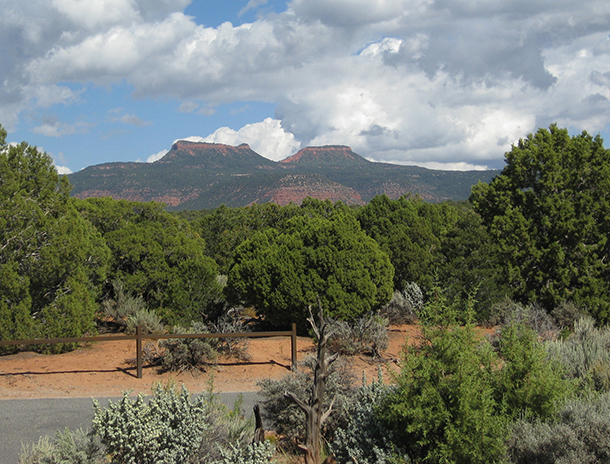
A pair of twin buttes gives the Bears Ears area its name. (Photo: brewbooks, Flickr CC BY-SA 2.0)
Author Terry Tempest Williams calls the US national parks “breathing spaces” for the American public. Her new book The Hour of Land creates a series of lyrical portraits of national parks that hold personal significance. Host Steve Curwood and Terry Tempest Williams discuss the national parks as places of refuge vital for the enjoyment of the public, and the author’s choice to protect some Utah land from oil and gas development.
Transcript
CURWOOD: It’s Living on Earth, I’m Steve Curwood. Terry Tempest Williams is one of the most celebrated of current writers about the American West, and she has a new book that has come out during the 100th year of the US National Park System. The volume is called "The Hour of Land", but it is as much, if not more, about people who visit the National Parks as the iconic landscapes themselves. Terry is on the line now from her Wyoming home near Grand Teton National Park. Terry, welcome to Living on Earth.
WILLIAMS: Thank you so much, Steve. It's a joy and a pleasure.
CURWOOD: Why did you set out to write this book?
WILLIAMS: I love the National Parks, and growing up in Utah, we're surrounded by National Parks and Monuments. Zion, Bryce, Canyon Lands, Arches, and Capitol Reef.,so, for a child growing up it was our backyard and it remains so now. And the book is called "The Hour of Land" and yet it's about people.
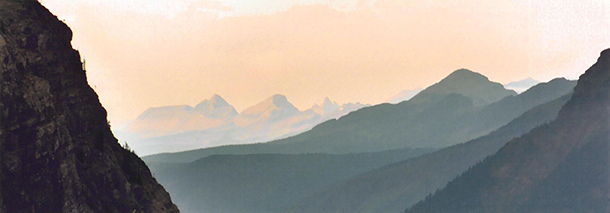
Smoke filled the valleys of Montana’s Glacier National Park in 2003. The Tempest family nearly perished in the fire when it roared around the lodge where they took shelter. (Photo: Jan Tik, Flickr CC BY 2.0)
I'll never forget my grandfather, Jack Tempest. I was in college and he called me and said “I’d like to talk to you,” and that was very rare. He was a very stoic, private man, and I immediately went over. We sat down and he said, "I want you to tell me three experiences that you’ve had in widerness. And I'm listening." And I said, "OK, the time when our family was walking down the Zion Narrows."
“OK, one. And tell me about the Zion Narrows."
"Well, Dad was leading. Mother was behind him, and Steve and I and all the boys, we were following. It was dawn, just first light and I've never felt so connected."
He said, "OK, give me the next time."
"It was in the Tetons. We were on the Teton Crest Trail. Again, with my father and cousins."
And it went on like that, and then he said, "Stop, do you recognize that every single experience you've told me had people, and people that you love?"
And that was a teaching moment for me, Steve, and I realized we're not separate. Whenever we're in the land, we are part of the land.
CURWOOD: You’re speaking to us right at the edge of the Grand Teton National Park. Tell me the story of your family’s experiences with Grand Teton near Jackson Hole, Wyoming.
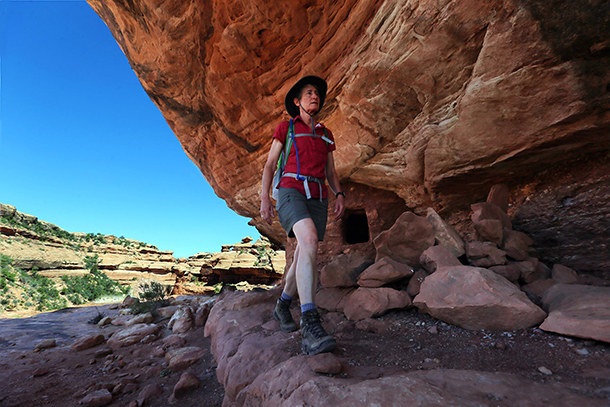
Secretary of the Interior Sally Jewell visited ancient cliff dwellings in McCloyd Canyon near Blanding, Utah during her July 2016 trip to the proposed Bears Ears National Monument area. (Photo: Scott G Winerton, Deseret News / U.S. Department of the Interior, Flickr CC BY-SA 2.0)
WILLIAMS: I call it “My Mother Park.” My first memories here, of drinking water with cupped hands at Hidden Falls and Cascade Canyon; across from Jenny Lake my mother on one side, my grandmother on the other, and hearing them say, “Drink deeply, Terry. This is the source.” I’ve never forgotten that. Five generations standing on the side of the road listening to the elk bugle under a full moon; one of them being my great aunt who was losing her hearing and she said.“When you hear the elk – I can’t hear it -- but just raise your hands, because I remember it.” The history is long and deep and generational. It’s a memory palace. Relatives’ashes are scattered here, and my father is here now, as am I, so it’s a migratory path for our family, and I think many families have these familial memories with particular National Parks.
CURWOOD: Those places that are so familiar to you, you know, there's a spiritual aspect to some of those places. I remember going to Capitol Reef with a group of tough environmental journalists going out for a hike, and as we were coming up through part of the park where there is this big overhang, almost looked like an amphitheater of some kind, everybody in the group spread out so that we were all by ourselves out of the earshot of the footfalls, and it was if we went into some sort of meditation getting out of the newsroom and all of that. How common do you think it is for people to feel that there's something spiritual in a wild place, National Park or not?
WILLIAMS: I think any time that we enter a National Park, we meet the miraculous. I do think it's a spiritual experience, especially now. You know, everyone now is so tied into technology and their mobile devices, and I think to go into a National Park and feel that quiet, that space, that overwhelming sense of “other,” it drops me to my knees. You know, whether it's the vastness of the Grand Canyon, shimmering waters in the sawgrass of the Everglades or that rocky edge of Maine in Acadia National Park, for me it is a deeply spiritual experience.
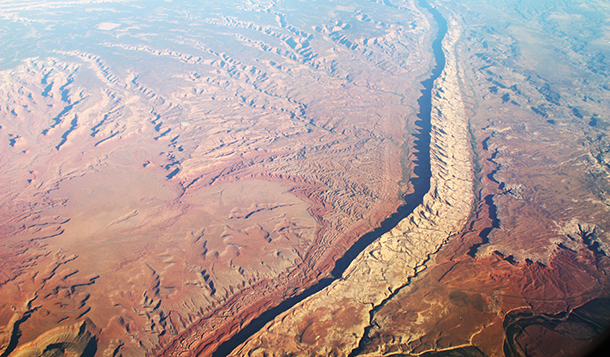
A distinctive geologic formation called Comb Ridge would be included in the proposed Bears Ears National Monument. The ridge is 21 miles long and composed of Navajo Sandstone rock. (Photo: Doc Searls, CC BY-SA 2.0)
CURWOOD: So, these National Parks according to this book are been dangerous for you. Tell me the story of how you and your family almost perished in Glacier National Park?
WILLIAMS: Maybe it's our family name, Tempest, I don't know, (Curwood laughs.) but it was my father's 70th birthday. He wanted to repeat a trip that we had taken 10, 15 years before, hiking to the Granite Park chalet. We did that. I think there were 16 of us, three generations, and it was beautiful, but then suddenly we realized that this was the season of fire. There was a perfect storm brewing, literally, and what looked like fires from afar suddenly became perilously close. My eyelashes were singed. The flames were so close, the heat was so intense. We had to all gather inside the Granite Park chalet in a circle on the floor with the children in the center and we were told by the fire ranger who was helicoptered in that the fire was going to roar over us that we would bear down, hold our breath. It was going to be uncomfortable. The windows were going to blow out, but hopefully the fire would roar past us. Miraculously, the fire split around the stone building and raced up a swift current pass, and we survived.
CURWOOD: And what did you take away from that experience?
WILLIAMS: Awe. Fear. Gratitude. Family. You know, when we hiked out in single file the next morning with the ranger in front and a ranger in back, the grizzly bears were walking right below us. There's always risks, but I think it reminds us that we're vulnerable. We're not the only species that lives and breathes and dreams on this planet.
CURWOOD: Terry, why did you call your book "The Hour of Land"?
WILLIAMS: Would you believe me if I told you, it came to me in a dream?
CURWOOD: Of course. Why not?
WILLIAMS: I do a lot of my ... I call it “night work,” the work that means most to me as a writer and it's a question that I set to my night mind, and when I wake up it's usually there. And "The Hour of Land" came that way.
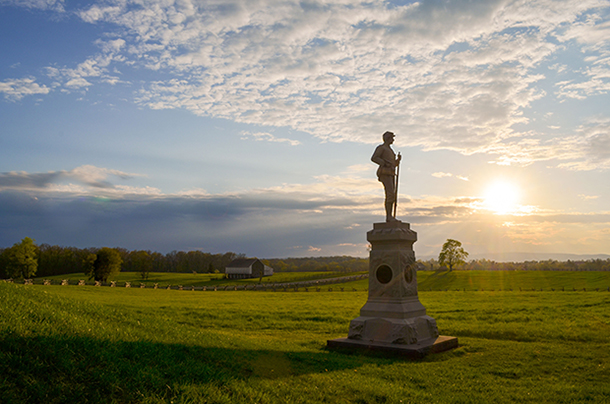
Some national parks, including Gettysburg National Military Park in Pennsylvania, are primarily dedicated to educating visitors about historical events. (Photo: Jen Goellnitz, CC BY-NC-ND 2.0)
I believe that this is the hour of land, especially now when we on so many levels have forgotten the source, that we are tied to the land, to the earth, and never has that mattered more than now, whether it's the violence that we're seeing on our streets, be it in Dallas or Baton Rouge or Minnesota, or whether it's climate and rising seas. This book is about listening, whether we're listening to our genealogy, whether we're listening to Sandhill Cranes, whether we're listening to one another. I think this is what is getting lost. We have become a people of opinions, and we barely speak to those who have different opinions. And our National Parks open us to those different kinds of conversations.
CURWOOD: And how important is it to listen to the land?
WILLIAMS: For me, personally it's essential. In June, I was able to go to Yosemite National Park and listen to President Obama speak, and I was undone by his joy, and particularly there was a sense of relief. You know, he arrived with his family in the aftermath of the mass murders at Orlando and Yosemite Falls was in the background, and he turned and looked over his shoulder and he just said, "This, this is what reminds us that we belong to something bigger than ourselves." He broke from the script that had been prepared for him, and he talked about how when he was 11 years old, his mother took him to the mainland for the first time, and they went to Yosemite. And he spoke passionately about seeing a moose for the first time standing in a pond, of turning, and there was a meadow of deer and turning again and seeing a female grizzly with cubs. And he turned to the audience and he said, "It changes you. It changes me, and that's why I want to see more National Parks and Monuments and why I'm so determined to see that people of color, people that live very close to Yosemite who have never been here, have that opportunity."
CURWOOD: Terry, you know, in this country, wilderness is often associated with privilege. What do you say to folks that say that National Parks are just preserving wild spaces for the rich and the privileged?
WILLIAMS: I understand their point of view, but I don't agree with it. You know, I talk about how our National Parks in this country are not, perhaps, our best idea as well, as Wallace Stegner said, whom I love, but an evolving idea, and that I believe. And nowhere is that more prevalent than in Utah right now. Secretary of the Interior Sally Jewell is coming to Utah in Bluff, and she's meeting with the tribal leaders of the Ute, the Navajo, the Hopi, the Zuni, over 25 tribes in the Colorado Plateau to talk about their desire and their proposal to create the Bears Ears National Monument. Now that is not for the rich and privileged. That is to secure and to protect their cultural ways of life. Their ancestors' bones are buried there. Their ceremonies are performed there. Their medicines are found there. And I'm hoping that in this evolutionary spirit, Secretary of Interior Jewell and President Obama, certainly, will see the importance of this and create a National Monument in Utah adjacent to Canyonlands in Bears Ears as a bow to the tribes, as a moment of peace in very turbulent times, especially with race in this country.
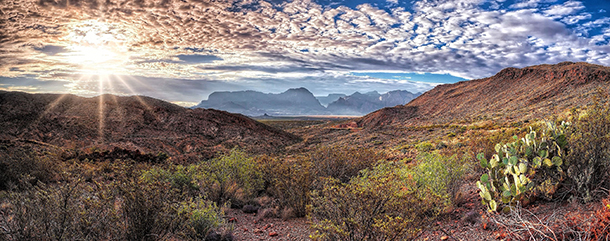
Terry Tempest Williams wrote about the desolation of Big Bend National Park in The Hour of Land. The Texas national park remains one of the least visited in the U.S. (Photo: Dave Hensley, Flickr CC BY-NC-ND 2.0)
CURWOOD: We're recording this on the 11th of July. The US House of Representatives is expected to vote sometime in the near future on a proposal that would exempt some 48 counties, primarily in the west, from that Monument creation law and the counties will be exempted from the Antiquities Act which can be used to create, essentially, the equivalent of a National Park - would hit the territory of Bears Ears. So what do you make of this move in Congress by the Republican side to block efforts to create the Bears Ears? It also would throw a roadblock in front of the creation of a national monument in Maine and elsewhere.
WILLIAMS: You know, this is an old story. When they created Grand Teton National Park and Monument, they did block any more use of the 1906 Antiquities Act in the state of Wyoming. When Grand Staircase-Escalante National Monument was made in 1996 in Utah, there was outcry among a certain part of the state. Now, it's a huge engine for economic growth. People say that public lands, our national parks are elitist, but in reality, they are our commons. They belong to all of us.
CURWOOD: Terry, not so long ago, you and your husband, Brooke, went on a spending spree. You bought yourself an oil and gas lease on federal lands there in Utah. But obviously, you have no plans to develop these particular resources, although, as I do understand it, in the past the Tempest family has been in the pipeline business. Why did you buy this lease, and what do you plan to do with it?
WILLIAMS: You know, it's a complicated story, Steve. It's true. Our family business, four generations, lays pipe, whether it's natural gas, water lines, or sewage. My family, my brothers, my father, my uncle, my great grandfather, have dug those trenches. So they're not in the oil business per se, but they create the pipe that services the communities. So you can understand that when Brooke and I chose to purchase two oil and gas leases, my father was not thrilled because we benefited from that business. But I think it's wrong, what's happening on our public lands with oil and gas development. If you come out to Utah or anywhere in the interior west, from an aerial point of view, from a raven's point of view, it looks like an exposed nervous system. There's so many roads, drill rigs, and fracking going on, it breaks your heart, and if the American people knew that our public commons were being leased for a dollar $1.50 an acre, I think they would be as outraged as we are, and I think now with climate change, climate justice, we have to change our ways, and this was an act that Brooke and I felt would contribute to a different kind of conversation.
CURWOOD: And Brooke is your husband, of course. What will you do with it now?
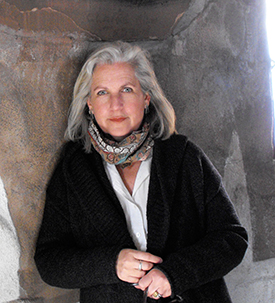
Terry Tempest Williams is the author of The Hour of Land, Refuge, and ten other books. (Photo: Louis Gakumba, courtesy of Terry Tempest Williams)
WILLIAMS: Well, the Bureau of Land Management has not given us our leases yet that we paid for, and it's now going on six months. The oil and gas companies that also bought leases, they were given their leases immediately, and, truth be told, they have no intention of drilling on those lands either, maybe for different reasons. They're not going to drill on those lands until the price of oil goes up. We've been very public saying, “We don't want to drill on these lands until science can so us that the fossil fuels are more above land than below given the costs of climate.” We were just out on the lands, and they are just absolutely stunning, I have to tell you. We remain hopeful. We are in compliance with the law even as we are pushing the law.
You know, these kinds of actions are not without their costs, but what is the cost if we choose to do nothing? I think each of us, in our own way, in the places we call home, can think about what actions can we participate in that might make a difference in terms of our own sense of community, especially given climate change, especially given public lands and the threats that they're under, especially given the kind of violence that we're seen all over this country. I think we're hurting and we've got to find ways to heal ourselves and our communities.
CURWOOD: Looking ahead, Terry, what's next in these times, and what's next for you?
WILLIAMS: I don't know and that's an honest answer. I resigned from my job at the University of Utah, from the very program that I helped create, the Environmental Humanities Graduate program. I'm sure that the purchasing of the oil and gas leases had something to do with that though I will never know.
CURWOOD: Wait. You said you resigned, but sounds like you got fired.
WILLIAMS: You know, I was politely told that I would longer be teaching there anymore, without going into all the details, and I fought it until I recognized a straight jacket when I see it. So I actually don't know what's next. I'm hoping that the BLM will give us our leases, and I would love to see what we might do there, in learning more about the fossil fuel industry and what our options are if we're concerned not with profit but planetary health and energy, a different kind of energy, an energy that could fuel a different kind of consciousness. I hope I can continue to teach, and I hope I can continue to write this. But at this point I'm really more concerned about, how do we behave as citizens in this country, in a country that feels so at odds with itself? And it goes back to our public lands, our National Parks. I believe they’re breeding spaces in a country where we are increasingly holding our breath.
CURWOOD: Terry, before you go would you would you mind reading one of your favorite passages out of your book?
WILLIAMS: Of course.
“We the people have made mistakes. We've made mistakes in our relationships with those who came before us and the land that holds their histories. We've made mistakes in how we have managed and misunderstood the wild, but after spending a lifetime immersed in our National Parks, I believe we are slowly learning what it means to offer our reverence and respect to the closest thing we as American citizens have to sacred lands.”
CURWOOD: Terry Tempest Williams' book is called "The Hour of Land". Thank you so much for taking this time with us today, Terry.
WILLIAMS: Thank you so much, Steve. I so appreciate the depth and rigor of your questions.
Links
Terry Tempest Williams’ author website
High Country News: “Emotions run high over monument designation in Utah”
The Public Lands Initiative, a bill introduced as a counter to the Bears Ears National Monument
Author Andrea Wulf reviews ‘The Hour of Land’ for the New York Times
Living on Earth wants to hear from you!
Living on Earth
62 Calef Highway, Suite 212
Lee, NH 03861
Telephone: 617-287-4121
E-mail: comments@loe.org
Newsletter [Click here]
Donate to Living on Earth!
Living on Earth is an independent media program and relies entirely on contributions from listeners and institutions supporting public service. Please donate now to preserve an independent environmental voice.
NewsletterLiving on Earth offers a weekly delivery of the show's rundown to your mailbox. Sign up for our newsletter today!
 Sailors For The Sea: Be the change you want to sea.
Sailors For The Sea: Be the change you want to sea.
 The Grantham Foundation for the Protection of the Environment: Committed to protecting and improving the health of the global environment.
The Grantham Foundation for the Protection of the Environment: Committed to protecting and improving the health of the global environment.
 Contribute to Living on Earth and receive, as our gift to you, an archival print of one of Mark Seth Lender's extraordinary wildlife photographs. Follow the link to see Mark's current collection of photographs.
Contribute to Living on Earth and receive, as our gift to you, an archival print of one of Mark Seth Lender's extraordinary wildlife photographs. Follow the link to see Mark's current collection of photographs.
 Buy a signed copy of Mark Seth Lender's book Smeagull the Seagull & support Living on Earth
Buy a signed copy of Mark Seth Lender's book Smeagull the Seagull & support Living on Earth

